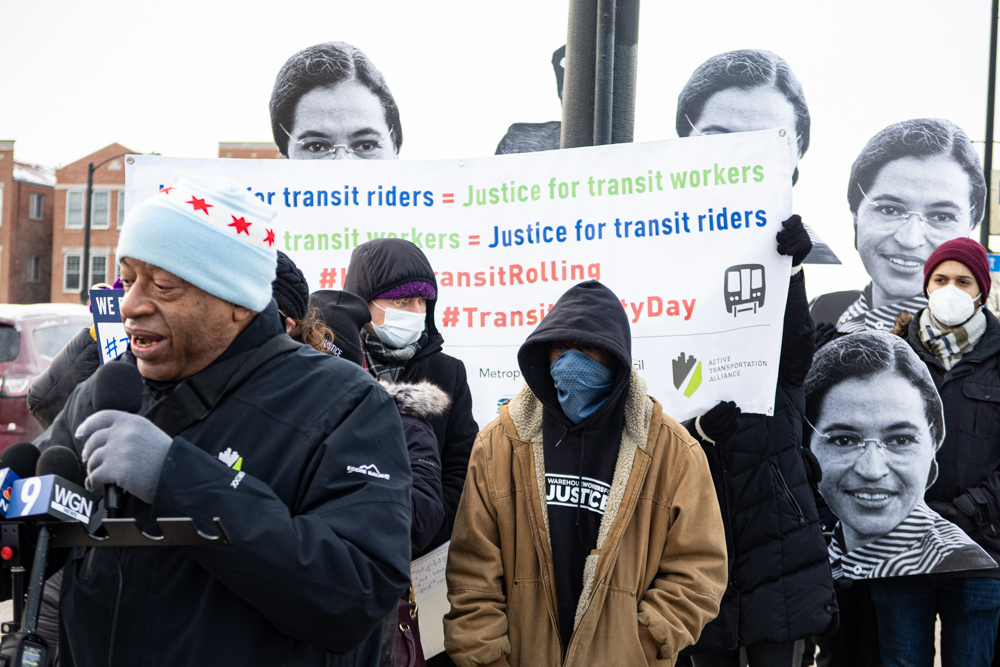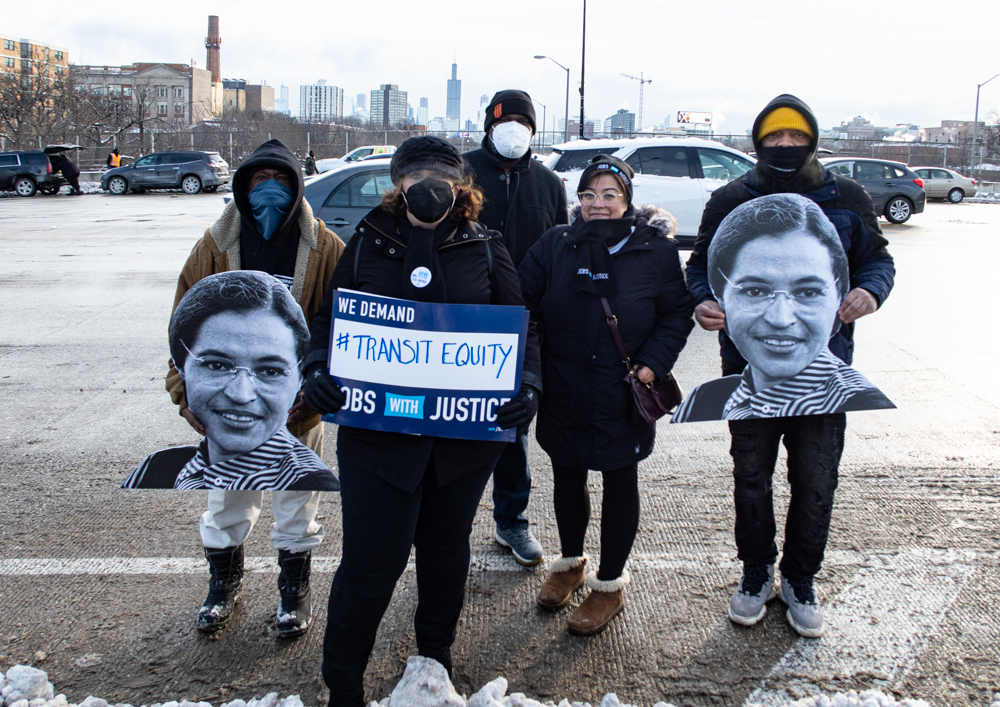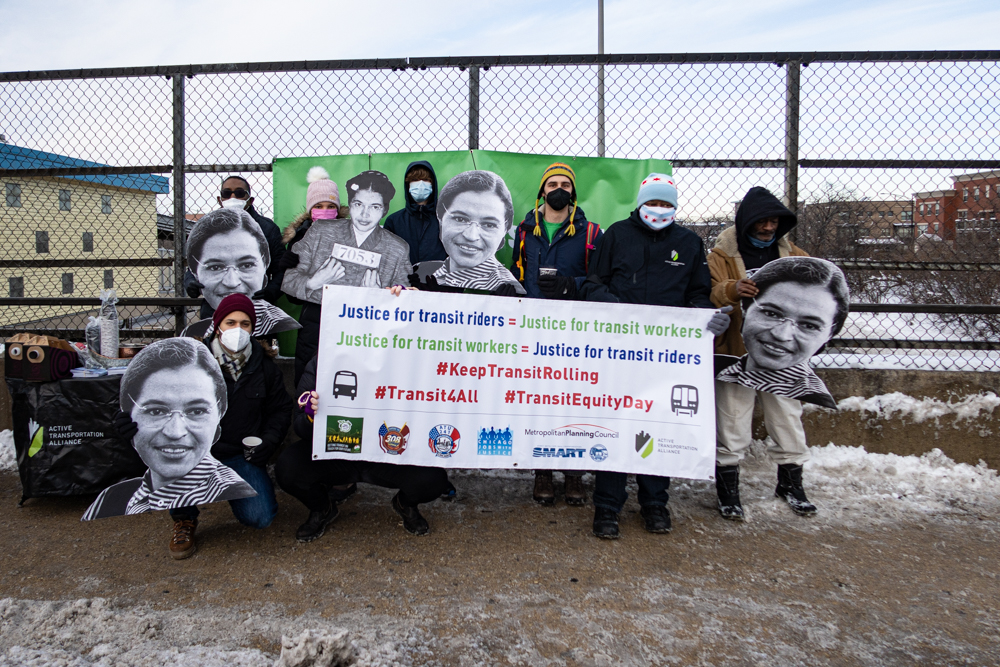Did You Know?
Transit Equity Day event calls for investment in transit workers & riders

Chicago Jobs with Justice recently launched Chicago’s first-ever transit riders union under its campaign Transit4All.
Active Transportation Alliance joined Chicago Jobs with Justice for the launch of their initiative as did Warehouse Workers for Justice, Sierra Club of Illinois, and local transit advocates. The goal is to foster an independent organization that would improve public transit for both riders and workers.
At a recent event that took place on Transit Equity Day, February 3, announcing the initiative, speakers from the organizations called for:
- System-wide transit station accessibility
- Equitable investments in the transit workforce
- Increasing the frequency of transit service, especially during off-peak hours and in the outlying areas of the city and suburbs
- Full electrification of our buses and trains to lessen air pollution and climate change
“Black people across the country are more likely than white people to count on buses, trains, and other forms of public transit as their primary transportation option, and are more likely to use public transportation to get to work,” said W. Robert Schultz, III, campaign organizer with Active Transportation Alliance. “Therefore, investments in public transit contribute to economic opportunity for Black and brown working people.”
A report that was released on Transit Equity Day shows how investments in the public transit workforce are urgently needed to boost economic opportunity and racial equity in our communities. The report notes how the aging transit workforce and the effects of the COVID-19 pandemic have reduced transit staffing levels, and left many public transit systems unable to meet the needs of the communities they serve.
That’s, of course, a problem for the millions of people in cities and rural communities across the country who rely on public transit every day, as we have witnessed firsthand in Chicago.
The report emphasizes that the starting point for addressing any workforce problem is to engage in a dialogue with transit employees themselves through their democratically elected union representatives, as well as riders and other community stakeholders. Operators, maintenance employees, and other transit workers know better than anyone how to improve job quality in order to hire and retain a skilled and robust transit workforce.
“Our transit workers are on the front lines every day. We are proud of the work we do under difficult circumstances, including this global pandemic,” said Keith Hill, President of ATU Local 241, which represents local transit workers. “Our transit workforce deserves the very best in safety, pay, benefits, and working conditions.”

At the Transit Equity Day event, Alfred White of Warehouse Workers for Justice spoke about his extraordinarily long commute from his home on Chicago’s South Side to an Amazon warehouse in Joliet. The length of his commute prevents him from being able to work full time, which in turn prevents him from being able to afford a car, which would allow him to cut his commute in half at least.
“Transit equity is essential in achieving climate justice. Climate change is already disproportionately affecting Black and brown communities,” said Sam Beard, organizer with Sierra Club Illinois. “Prioritizing transit helps us mitigate carbon emissions and climate change impacts.”
As part of the event, we asked people to use social media to share how their transit experience could be improved — with the following hashtags:
Here are a few Tweets using the hashtags:
Safe, accessible public transit is a civil rights issue–it should also be a human right. This is NOT ACCEPTABLE. (No sidewalk, nowhere off the street to wait for @PACE bus) @activetrans @transit4a #KeepTransitRolling #Transit4All #TransitEquityDay pic.twitter.com/JV9NK2w2BU
— Jane (@BikingMom) February 4, 2022
Mass transit should be pervasive, frequent & efficient to support equitable opportunities throughout the city. Strategies including full funding, BRT & ensuring clear & accessible bus stops should be utilized to make it happen. #KeepTransitRolling @activetrans #TransitEquityDay
— Bikes 🚴♀️ Peace ✌ Love ❤ (@NWChiFiets) February 4, 2022
Chicago now has a transit rider’s union: @Transit4A! This is something the region has needed for a long time. I’m excited to get involved and watch them grow!#KeepTransitRolling #Transit4Allhttps://t.co/QAirySNB5q
— Jeremy Glover (@JGrantGlover) February 4, 2022
This morning, we joined @ChicagoJwJ, @activetrans, @ATUComm, @LN4S, & @Transit4A for the official launch of Chicago’s FIRST transit riders union on #TransitEquityDay! #transit4all pic.twitter.com/O3PmWg47dj
— Illinois Sierra Club (@SierraClubIL) February 4, 2022
Missed out on the fun? Text “Transit4All” to (773) 261–8899 to get involved. Stay tuned for more events as well as canvassing opportunities in the near future.
Make a Donation
Your tax-deductible donation supports the important work that Active Trans does throughout the region

